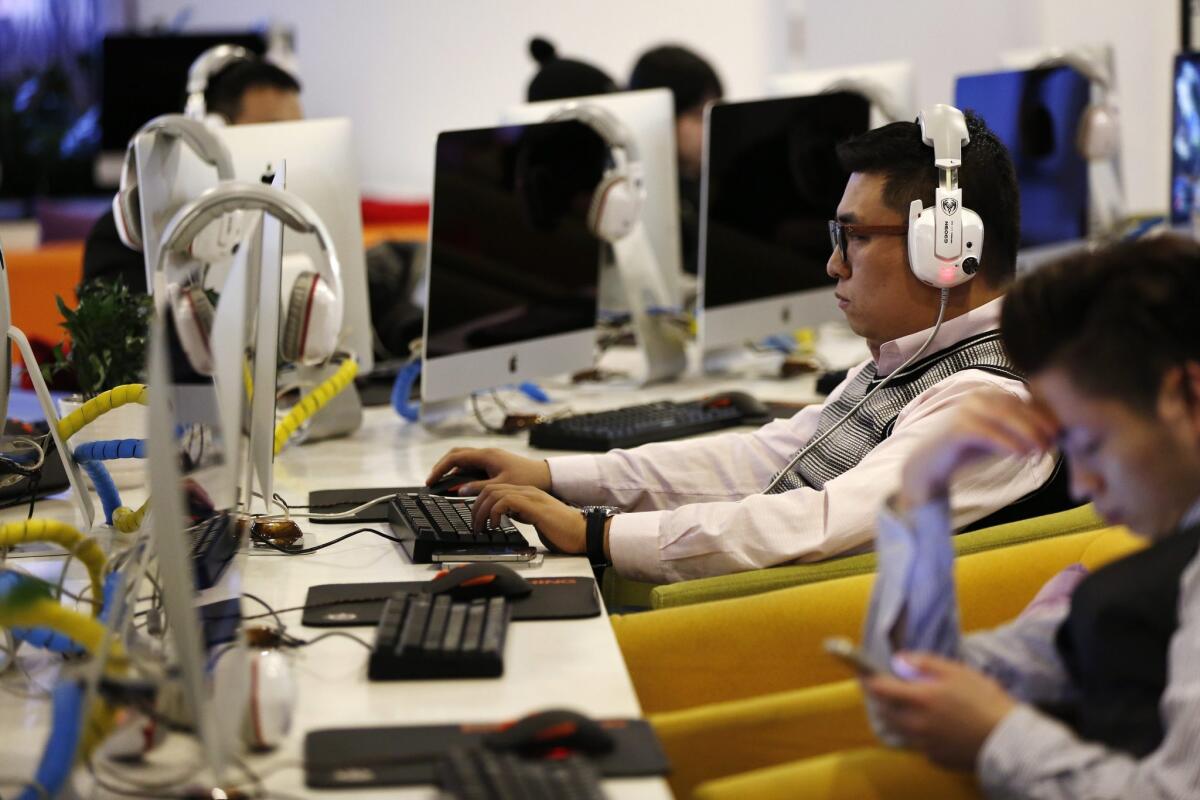Op-Ed: A return to China’s isolationist past would be disastrous

- Share via
Beijing increasingly appears to be walling China off from the outside world, with potentially disastrous consequences.
Take civil society. China’s national legislature is considering a bill that would further restrict the operations of foreign non-governmental organizations, deepening the bitter chill that has descended on the operations of domestic and foreign nonprofits over the last year.
Or look at the Internet. State authorities once confined themselves to censoring dissident voices. Now they are disrupting technologies such as virtual private networks that China’s tech gurus and foreign companies rely on to access commercial sites abroad and to scale the so-called Great Firewall, which blocks sites the government doesn’t want people to see.
Higher education is another example. Universities that once thought themselves exempt from official pressure now are accused of facilitating the nefarious infiltration of “Western values” and are forced to fend off calls to ban or amend textbooks.
China is steadily drifting away from the reform path set in the late 1970s. Then, Deng Xiaoping opened China to the world, encouraging citizens to seek knowledge abroad. Today, Chinese leaders increasingly call for it to return to its own past.
But what period do they want to return to?
Historically, China’s most glorious eras have been its most open ones.
During the cosmopolitan Tang (618-907 AD) and Song (960-1279 AD) dynasties, central Asian traders flocked to the imperial capital, Arab merchants to eastern seaports. China grew wealthy from trade. While medieval Europe remained wracked by purges against Muslims, Jews and all who dared challenge the ideological orthodoxy of the church, China was open to the world.
Innovation flourished: Gunpowder, paper currency and the navigational compass were all invented during this time. Emissaries from neighboring states streamed to China. Japan adopted Chinese writing and modeled its first capital after the Tang imperial court. Japan did this not because it was compelled to by force but because an open, self-confident China was one of the great centers of civilization.
Culture flowed the other way too. Foreign dance and music were imported from Central Asia, and beliefs such as Buddhism entered from India. These fused with China’s indigenous traditions to become integral parts of a vibrant intellectual and cultural heritage.
Then there are the other eras, when paranoid imperial rulers lashed out at foreign influences and cut China off from the outside.
After the collapse of Mongol rule in the 14th century, Ming emperors briefly flirted with other cultures. But then they turned inward. They adopted a narrow ethnic self-conception. Mongol cultural influences were purged, foreign trade barred. Similar trends took place after the founding of the modern People’s Republic of China. Communist leaders expelled Western missionaries, then Soviet advisors. China retreated back into splendid isolation.
Such measures helped repressive rulers strengthen their iron grip over society, but they crippled China. The Ming fleets that had begun to explore the Indian Ocean were called home and cut up for scrap, just as Spanish and Portuguese explorers set forth on their voyages of discovery. As the scientific and industrial revolutions rippled through Europe, China fell behind. And when Mao Tse-tung closed the nation off in the mid-20th century, the results were equally disastrous: decades of economic stagnation, mass famine (Great Leap Forward, 1958-60) and political chaos (Cultural Revolution, 1966-76).
Today, China’s leaders have begun to tentatively steer their nation down a similar path. They might go further. Faced with a restless society, they could expel even more foreign journalists, further block cultural imports, sharpen attacks on “foreign” religions such as Christianity and Islam, and tighten their suppression of Uighur identity in Xinjiang province. They could stress a narrow concept of what it means to be Chinese, ram patriotic education through Hong Kong schools, and whip up nationalist sentiment among the discontented and underemployed flowing out of China’s colleges.
They could also fuse Marx with Confucius to create a new ideological orthodoxy. And when populist anger begins to seethe over a slowing economy and widening divide between rich and poor, the government could redirect it at liberal intellectuals and economic elites to steer it away from central party officials.
But if they do all this, the results will be catastrophic. It would pit Chinese citizens against one another. It would shut down innovation and weaken China’s influence abroad. And it would eventually turn on China’s leaders themselves, many of whom see this danger all too clearly and are privately hedging against it by stashing their wealth and children abroad. In short, it would repeat precisely the same errors that generations of enlightened Chinese leaders — including Communist luminaries such as Deng Xiaoping — have sought to escape from.
Carl Minzner is a professor at Fordham Law School, specializing in Chinese law and politics.
Follow the Opinion section on Twitter @latimesopinion and Facebook
More to Read
A cure for the common opinion
Get thought-provoking perspectives with our weekly newsletter.
You may occasionally receive promotional content from the Los Angeles Times.






